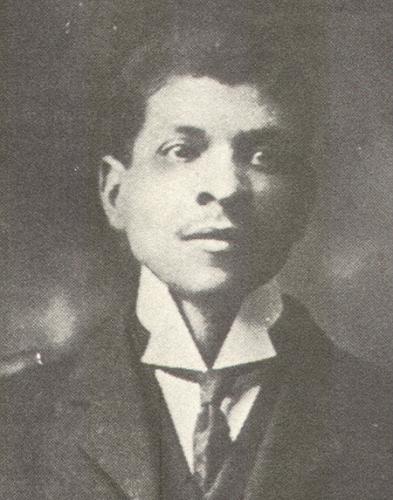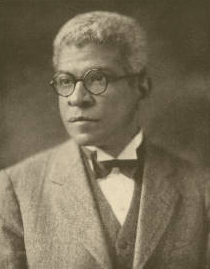See also: North Carolina Mutual Life Insurance Company
1 Aug. 1874–1 Aug. 1952

Charles Clinton Spaulding, black businessman and community leader, was born in Columbus County to parents descended from a long-standing community of free Blacklandholders in the area. A family oral tradition holds that his great-grandfather, an emancipated house servant from Wilmington, migrated west in the early 1800s to Columbus County, where he joined an insular community of free farmers of color with Black and American Indian roots. Both of his parents, Benjamin McIver and Margaret Moore Spaulding, were third-generation members of this distinctive settlement.
In 1894 Spaulding left the family farm for Durham, where he finished high school and worked at a succession of "Negro jobs"—dishwasher, waiter, bellhop, and office boy. In 1898 he became the manager of an all-black cooperative grocery store; his success in that post won him a managerial position in another black business, the North Carolina Mutual Life Insurance Company. Founded in 1898, North Carolina Mutual was on the brink of failure when Spaulding became general manager in 1900. By 1910 the company boasted of being "the world's largest Negro business," and Spaulding and two of the original founders, John Merrick and Dr. Aaron M. Moore (Spaulding's uncle), were heralded in North Carolina's Black community as the "Triumvirate," the epitome of Booker T. Washington's "black captains of industry." Durham, in turn, became known as the "capital of the black middle class."
In 1923 Spaulding succeeded Moore as president of North Carolina Mutual, and from that time until his death he enjoyed an international reputation as America's leading black businessman. He directed not only North Carolina Mutual but also an extended family of financial institutions, including Mechanics and Farmers Bank, Bankers Fire Insurance Company, and Mutual Savings and Loan Association. Out of such business leadership, Spaulding emerged as the patriarch of black Durham, with social and political influence extending throughout the southern region and beyond. As trustee of the John F. Slater Fund, North Carolina College, Shaw University, and Howard University, he played a significant formal role in black higher education. Informally he played a larger role, functioning as a New South broker for philanthropy and employment in black institutions. A letter from him, as from Booker T. Washington a generation earlier, carried decisive influence. As a successful business executive, he appeared to the white world of philanthropy and power as something of a brother under the skin, less the self-interested supplicant than the dispassionate statesman offering moderate advice on racial uplift. He regularly appeared before the North Carolina legislature on behalf of North Carolina College, and behind the scenes he labored to correct the inequities of the Jim Crow system, sometimes holding the fear of integration as a hostage to ransom a greater share of public funding for black institutions.

In politics and race relations, then, as in philanthropy and education, Spaulding's formal actions often masked the underlying process of Black politics in the New South. He served as a functionary in the Democratic party, especially during the New Deal when his recommendations influenced President Franklin D. Roosevelt's appointments to the "black cabinet," and when as president of the Urban League's National Emergency Advisory Council he became the official interpreter of the National Recovery Administration to the black community. Later in life he would decline appointments to the Fair Employment Practices Committee and as minister to Liberia. But it was at a less visible level, in his home state and in Durham, where as secretary of the North Carolina Commission on Interracial Cooperation and, more important, as chairman of the Durham Committee on Negro Affairs (DCNA), that he charted the passage between two eras of southern politics and race relations, the passage between classic paternalism dating back to slavery and direct politics looking ahead to the civil rights movement. Spaulding preserved the benefits of white patron–black client relationships at the same time he directed the DCNA towards a suffrage movement designed to replace those whimsical relationships. For whites his dexterous disavowal of "social equality" promised social control; cloaked in this context, the work of his more radical colleagues in the DCNA brought about black re-enfranchisement twenty years ahead of comparable southern cities.
Spaulding represented the last of a generation that hearkened back to the age of Booker T. Washington, and his skilled absorption of the politics to his left is perhaps a test case for what the Tuskegeean himself might have done. He spent his final years remaining active in the Baptist church, accepting honors, and giving speeches, his pioneering in black business long behind him and his transitional role in southern politics nearly completed. His three sons, Charles Clinton, Jr., John, and Booker, and his daughter Margaret, all children from his first marriage to Fannie Jones Spaulding, resided in Durham. His first wife died in 1919; his second wife, Charlotte Garner Spaulding, survived until 1971.